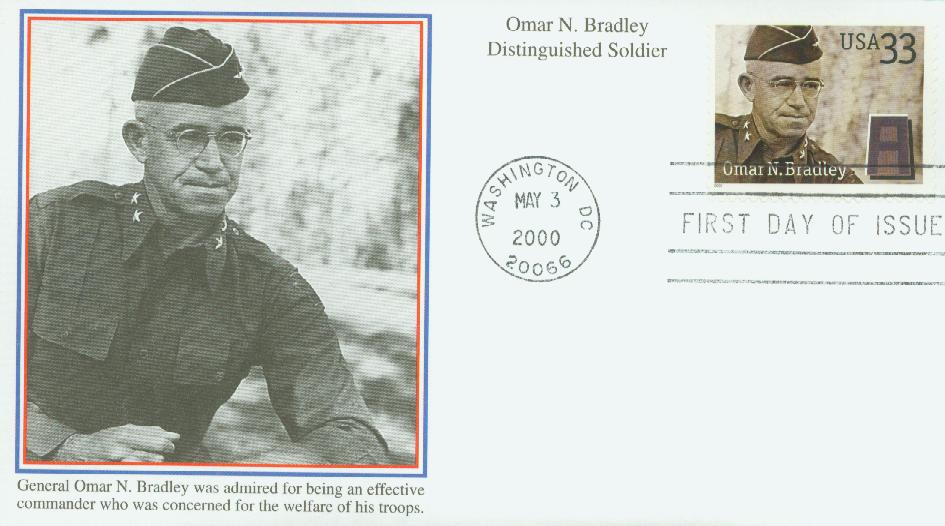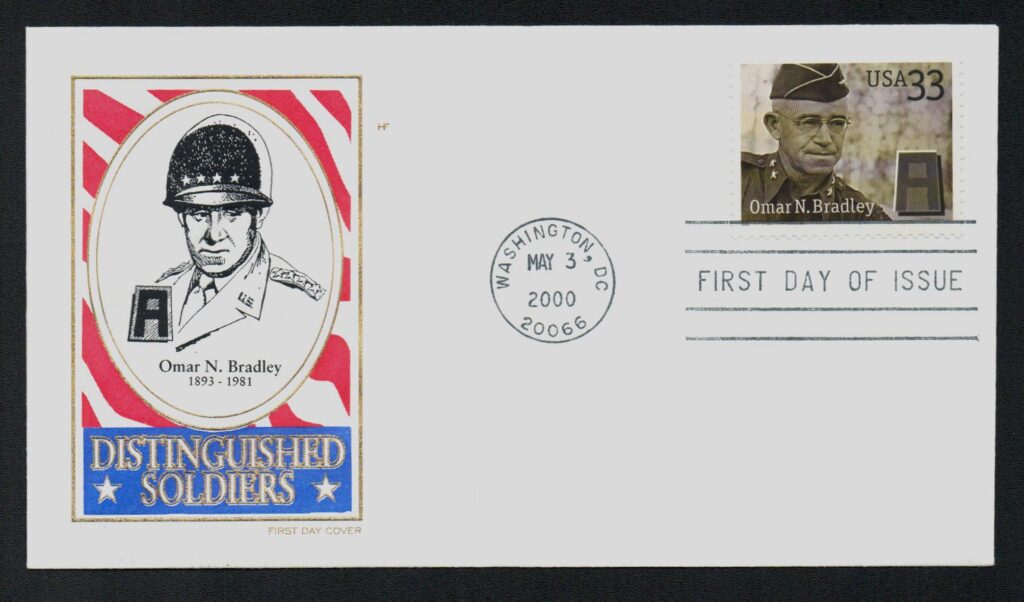US General Omar Nelson Bradley was born on February 12, 1893, in Clark, Missouri.
Bradley’s family didn’t have much money when he was growing up. But his father was a schoolteacher and he attended at least eight schools where his father taught. Bradley was a good student and athlete, serving as captain of both the baseball and track teams before graduating from high school in 1910.
After high school, Bradley worked as a boilermaker for the Wabash Railroad. Then his Sunday school teacher encouraged him to take the entrance exam for the US Military Academy at West Point. Bradley was accepted and was a good student, but focused more on sports. He was a baseball star and played on semi-professional teams for free. He was offered the chance to play professional baseball but wanted to continue his military career.
After graduating from West Point in 1915, Bradley first saw service along the US-Mexico Border. He was then promoted to captain and sent to guard the copper mines in Montana. At the outbreak of World War I, he hoped to serve in France but never had the chance. When the war was over, he taught military science at South Dakota State University and mathematics at West Point. In his free time, Bradley studied the Civil War campaigns of William T. Sherman and found his strategy was far more effective than that used during World War I. This knowledge helped him graduate second in his class in Infantry School.
As World War II broke out, Bradley developed the Officer Candidate School and created two fully trained divisions. He was then sent to North Africa in early 1943 and served as Dwight Eisenhower’s troubleshooter. Bradley suggested and oversaw the overhaul of the II Corps. By March, he was promoted to temporary lieutenant general before succeeding George Patton as head of II Corps. In this role, he directed the final Tunisian battle in April and May.
In July 1943, Bradley led the attack on Sicily. For his success, he was then selected to lead the first landings at Normandy and oversaw Operation Cobra. His troops were crucial in pushing the Germans back at the Battle of the Bulge and later helped capture some 300,000 German troops in the Ruhr.
Bradley commanded the largest US battle force ever assembled. The one million men he directed during World War II saw action in France, Belgium, the Netherlands, Germany, Austria, and Czechoslovakia. Bradley often located his command post at the battlefront and liked to visit the soldiers. He was one of the most respected wartime commanders because of his leadership qualities and genuine concern for the troops. Bradley was called the “GI’s General” because he looked after the well being of his men on the battlefield.
In 1948, Bradley became Army Chief of Staff and was promoted to general in 1950. He was the first chairman of the Joint Chiefs of Staff from 1949 to 1953 and served on NATO’s military committee. By 1950, the US military had faced numerous budget cuts and was not prepared when North Korea invaded the South. Bradley was charged with returning the forces to fighting strength and replacing outdated weapons. When the war began, he agreed with the President’s policy of occupying all of Korea and defeating the Communists. When China entered the war, he changed his plan to containing the enemy to the north. Bradley supported Truman’s dismissal of MacArthur, who was still convinced the US should continue to fight for all of Korea regardless of the cost in human lives. Bradley told Congress engaging China “would involve us in the wrong war, at the wrong place, at the wrong time, and with the wrong enemy.”
Retiring in 1953, Bradley chaired the Commission on Veterans’ Pensions (also known as the Bradley Commission) and served as chairman of the Bulova Watch Company. He was also a member of President Lyndon Johnson’s “Wise Men” think tank. He died on April 8, 1981.
Click here to see what else happened on This Day in History.






Thank you Mystic. Interesting that by studying the strategy of William Tecumseh Sherman from the Civil War helped him finish 2nd in his class in Infantry School. He had a brilliant career serving our nation.
Interesting tid bit about General Bradley being the chairman of the Bulova Watch Company caught my attention. Guess a much sought after skill is ATD (attention-to-detail) it pays in any work environment (battle field or precision watch making).
One of our greatest military leaders, and one who does not get the limelight of others with whom he served and led. Thanks Mystic.
My father was always a fan of Bulova watches, maybe because of the connection of Gen Bradley to the company? Hmm, will never know for sure. But maybe.
I have always admired him, my opinion admittedly shaped in part by the fetching portrayal of him by Karl Malden in Patton. I have a new affection for the 1964 Bulova Presidential watch I strapped on this morning. Thanks!
Good job Mystic. . A military hero I never knew much about and now do thanks.